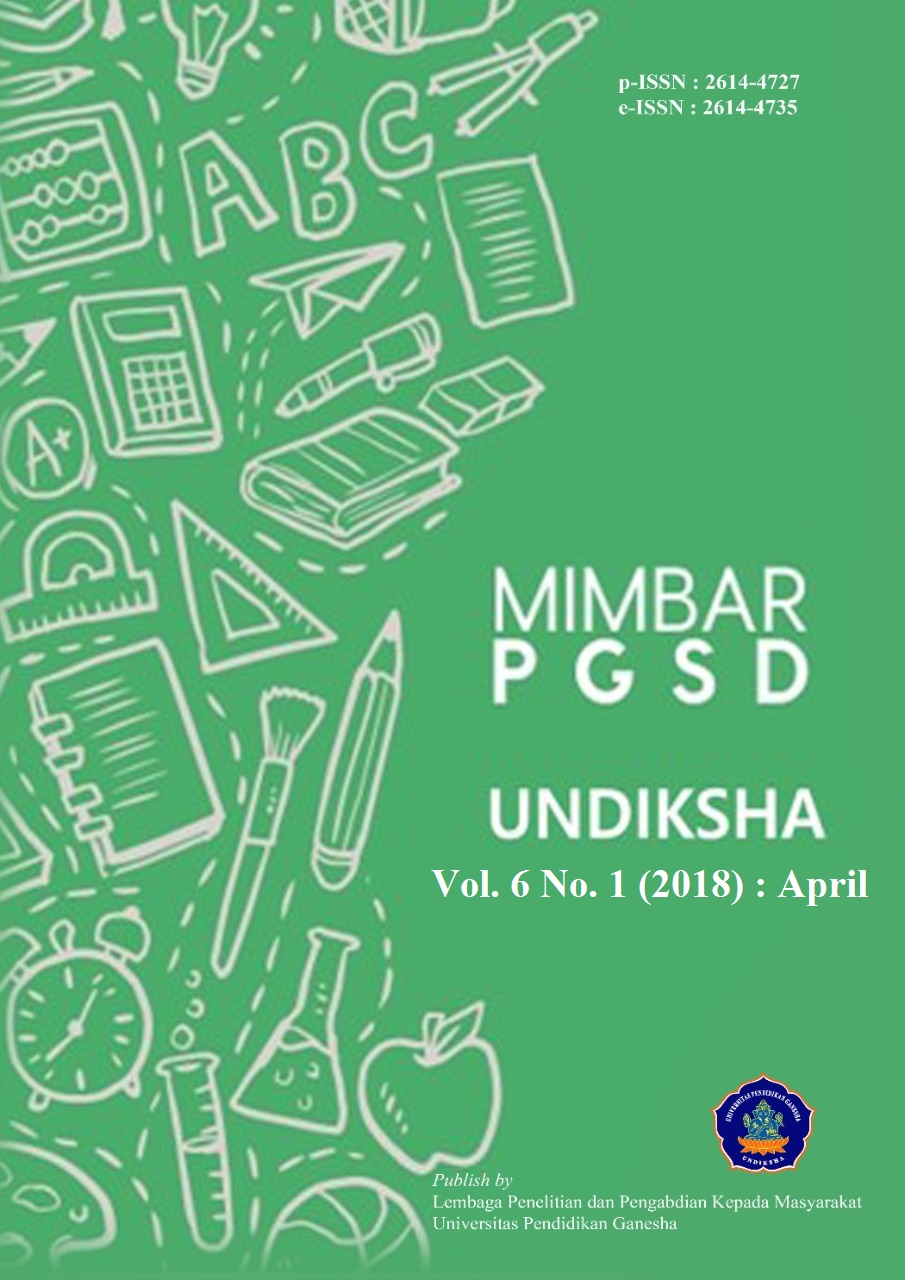PENGARUH STRATEGI SQ4R BERBANTUAN SATUA BALI TERHADAP KEMAMPUAN MEMBACA PEMAHAMAN SISWA KELAS V
DOI:
https://doi.org/10.23887/jjpgsd.v6i1.12920Abstract
Penelitian ini bertujuan untuk mengetahui perbedaan kemampuan membaca pemahaman siswa antara kelompok siswa yang dibelajarkan dengan strategi SQ4R berbantuan Satua Bali dan kelompok siswa yang dibelajarkan tidak dengan strategi SQ4R berbantuan Satua Bali pada siswa kelas V di SD Gugus V Kintamani Tahun Pelajaran 2017/2018. Jenis penelitian ini adalah eksperimen semu, dengan desain Non Equivalent post test only control group design. Populasi dalam penelitian ini adalah seluruh kelas V di SD Gugus V Kintamani. Sampel penelitian adalah kelas V SDN 3 Belantih sebagai kelompok eksperimen dan kelas V SDN Catur sebagai kelompok kontrol yang diperoleh dengan teknik random sampling melalui cara undian kelas. Metode analisis yang digunakan dalam penelitian ini meliputi analisis deskriptif dan analisis inferensial yang menggunakan uji t (polled varians). Hasil penelitian menunjukan bahwa, rata-rata skor kemampuan membaca pemahaman siswa pada kelompok eksperimen (41,80) lebih besar dari kelompok kontrol (34,27). Berdasarkan hal tersebut, terdapat perbedaan kemampuan membaca pemahaman siswa antara kelompok siswa yang dibelajarkan dengan strategi SQ4R berbantuan Satua Bali dan kelompok siswa yang dibelajarkan tidak dengan strategi SQ4R berbantuan Satua Bali pada siswa kelas V di SD Gugus V Kintamani Tahun Pelajaran 2017/2018. Dengan demikian, strategi SQ4R berbantuan Satua Bali berpengaruh terhadap kemampuan membaca pemahaman siswa kelas V di SD Gugus V Kintamani Tahun Ajaran 2017/2018.Kata Kunci : strategi SQ4R, satua Bali, kemampuan membaca pemahaman.
This study aims to determine the difference in students' reading comprehension skills between groups of students who were taught by the SQ4R-supported strategy of the Satua Bali and the group of students who were not taught by the SQ4R-supported strategy of Satua Bali in grade V students at SD Gugus V Kintamani Lesson Year 2017/2018. This research type is quasi experiment, with Non Equivalent design post test only control group design. The population in this study is the entire class V in SD Gugus V Kintamani. The research sample is class V SDN 3 Belantih as experimental group and class V SDN Catur as control group obtained by random sampling technique by way of class lottery. The analytical methods used in this study include descriptive analysis and inferential analysis using the t test (polled variance). The results showed that the mean score of students' reading comprehension ability in the experimental group (41.80) was greater than the control group (34,27). Based on this, there is a difference in the students' reading comprehension ability between the groups of students who were taught by the SQ4R-supported strategy of the Satua Bali and the group of students who were taught not with the SQ4R-supported strategy of Satua Bali in grade V students at SD Gugus V Kintamani Lesson Year 2017/2018. Thus, the Satya Bali-based SQ4R strategy has an effect on reading comprehension of grade V students in SD Gugus V Kintamani of the academic year 2017/2018.
keyword : SQ4R strategy, satua Bali, reading comprehension ability.
Published
2018-01-04
How to Cite
., I. M. D. G., ., D. I. K. S. M., & ., D. I. K. D. M. (2018). PENGARUH STRATEGI SQ4R BERBANTUAN SATUA BALI TERHADAP KEMAMPUAN MEMBACA PEMAHAMAN SISWA KELAS V . MIMBAR PGSD Undiksha, 6(1). https://doi.org/10.23887/jjpgsd.v6i1.12920
Issue
Section
Articles
License
Authors who publish with the Mimbar PGSD Undiksha agree to the following terms:
- Authors retain copyright and grant the journal the right of first publication with the work simultaneously licensed under a Creative Commons Attribution License (CC BY-SA 4.0) that allows others to share the work with an acknowledgment of the work's authorship and initial publication in this journal.
- Authors are able to enter into separate, additional contractual arrangements for the non-exclusive distribution of the journal's published version of the work (e.g., post it to an institutional repository or publish it in a book), with an acknowledgment of its initial publication in this journal.
- Authors are permitted and encouraged to post their work online (e.g., in institutional repositories or on their website) prior to and during the submission process, as it can lead to productive exchanges, as well as earlier and greater citation of published work. (See The Effect of Open Access)













